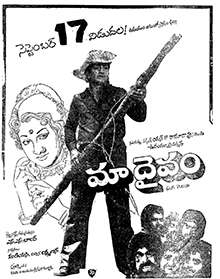Maa Daivam
Maa Daivam (transl. Our God) is a 1976 Telugu-language drama film, produced by Maniyan and Vidyas Lakshman under the Udayam Productions banner[2] and directed by S. S. Balan.[3] It stars N. T. Rama Rao, Jayachitra[4] in the lead roles and music composed by K. V. Mahadevan.[5] The film is a remake of the Hindi movie Do Aankhen Barah Haath (1957).[6]
| Maa Daivam | |
|---|---|
 Theatrical release poster | |
| Directed by | S. S. Balan |
| Produced by | Maniyan Vidyas Lakshman |
| Written by | D. V. Narasa Raju (dialogues) |
| Screenplay by | S. S. Balan |
| Story by | G. D. Madgulkar |
| Based on | Do Aankhen Barah Haath (1957) |
| Starring | N. T. Rama Rao Jayachitra |
| Music by | K. V. Mahadevan |
| Cinematography | M. C. Shekar |
| Edited by | M. Umanath |
Production company | Udayam Productions[1] |
Release date |
|
Running time | 144 mins |
| Country | India |
| Language | Telugu |
Plot
Raju (N. T. Rama Rao) is a Jail Warden who decides to rehabilitate six hardcore, notorious prisoners by releasing them on parole and the Govt. approves it on an ultimatum that Raju will be arrested if even one of the prisoners escapes. He takes them to a dilapidated country farm and makes them work hard with kindly guidance as they eventually produce a great harvest. They all come across Saroja (Jaya Chitra), an itinerant seller after they save her from a corrupt businessman Govinda Swamy (Giri Babu). As Saroja is homeless, the six prisoners plead with Raju to let the girl stay with them and he subsequently agrees.
Naganna (Prabhakar Reddy), one of the prisoners, coincidentally runs into his long-lost family, he tearfully reunites with them. But they appear homeless, and so Raju allows them also to stay with them, which angers the other prisoners who feel that Raju did not give them freedom, compelling them to try killing him in order to escape. They plan to kill Raju through one of the prisoners, Simhadri (Nagabhushanam), a barber using a trick to cut his neck while shaving, but Simhadri sees Raju's magical eyes and gets hypnotized, thus compelling him to abort the idea of murder. The prisoners who are attempting to escape see a statue of Lord Venkateswara in a temple and because they see Raju's spirit in it, they get hypnotized and eventually return. The prisoners gradually turn into good people and become attached to Raju, who dreams of marrying Saroja, in his mother's presence. One day, Raju sends the prisoners to the market for selling vegetables cultivated by them. There, Govinda Swamy and his henchmen mix up alcohol in their tea; while they return in a drunken state, they attack Raju and Saroja. Raju is not pleased with their status and commands them to kill him if that is what they want. Hypnotism and conscience again strike the prisoners, causing them to drop their weapons. The next morning, the prisoners fall at Raju's feet and earn the forgiveness of both Raju and Saroja.
Later, Govinda Swamy orders that Raju and prisoners surrender, or else their plantation and home will be destroyed. Raju refuses, so the Govinda Swamy sends his thugs and elephants to destroy everything in sight. However, Raju and his men vigorously battle all the thugs and emerge victorious, while the local police capture the corrupt. Raju, having been praised for transforming the six prisoners into reformed people, frees the prisoners and tearfully sees them off.
Cast
- N. T. Rama Rao as Raju
- Jayachitra as Saroja
- Nagabhushanam as Simhadri
- Giri Babu as Govinda Swamy
- M. N. Nambiar as Bhairavudu
- Padmanabham as Sanyassi
- Prabhakar Reddy as Naganna
- Rajanala as Supernatant
- Pandari Bai as Raju's mother
- Thyagaraju as David
- Bheema Raju as Khadar
- K. V. Chalam as Gopala Swamy
- Balakrishna as Veeranna
- Chalapathi Rao
- Jagga Rao
Crew
- Art: Srinivasa Rao
- Choreography: Saleem
- Fights: Maadakulam Allagiri Swamy
- Dialogues: D. V. Narasa Raju
- Lyrics: C. Narayana Reddy, Rajashri, Aarudhra
- Playback: SP Balu, P. Susheela, Vani Jayaram
- Music: K. V. Mahadevan
- Story: V. Shantaram
- Editing: M. Umanath
- Cinematography: M. C. Shekar
- Producer: Maniyan, Vidyas Lakshman
- Screenplay - Director: S. S. Balan
- Banner: Udayam Productions
- Release Date: 17 September 1976
Soundtrack
| Maa Daivam | ||||
|---|---|---|---|---|
| Film score by | ||||
| Released | 1976 | |||
| Genre | Soundtrack | |||
| Length | 18:09 | |||
| Label | AVM Audio | |||
| Producer | K. V. Mahadevan | |||
| K. V. Mahadevan chronology | ||||
| ||||
Music composed by K. V. Mahadevan. Music released by AVM Audio Company.
| S. No. | Song Title | Lyrics | Singers | length |
|---|---|---|---|---|
| 1 | "Oke Kulam Oke Matham" | Rajashri | SP Balu | 4:25 |
| 2 | "Maagha Maasam" | C. Narayana Reddy | Vani Jayaram | 2:44 |
| 3 | "Challani Chirugaali" | C. Narayana Reddy | SP Balu, P. Susheela | 4:33 |
| 4 | "Edho Edho" | Rajashri | SP Balu, P. Susheela | 3:45 |
| 5 | "Manishiloni Manasu" | Aarudhra | P. Susheela | 2:42 |
References
- "Maa Daivam (Overview)". Youtube.
- "Maa Daivam (Banner)". Chitr.com.
- "Maa Daivam (Direction)". Spicy Onion.
- "Maa Daivam (Cast & Crew)". gomolo.com.
- "Maa Daivam (Preview)". Know Your Films.
- "Bollywood Films Remade In South Indian Film Industry | 2nd Edition". Koimoi. 3 December 2014. Retrieved 26 March 2018.